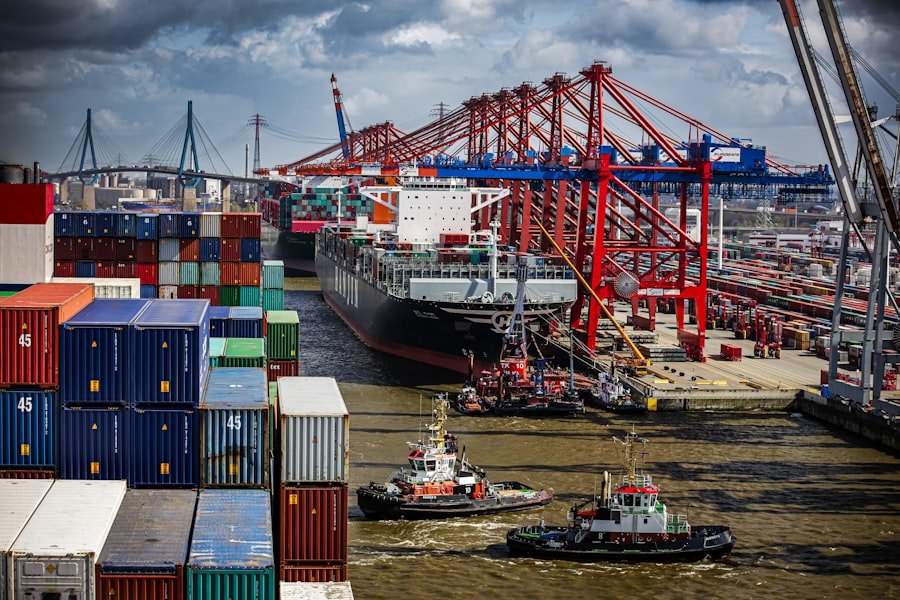Trade agreements are formal arrangements between two or more nations that specify the terms and conditions of their trade relations. These agreements aim to stimulate economic growth, generate employment opportunities, and enhance market access for goods and services. Emerging markets, in contrast, are countries undergoing rapid industrialization and experiencing substantial economic expansion.
These markets are typically characterized by high growth potential, large populations, and increasing consumer demand. The interplay between trade agreements and emerging markets is of significant importance to the global economy. Trade agreements can offer emerging markets access to new markets, advanced technologies, and foreign investment, while also helping to reduce trade barriers and foster economic development.
However, these agreements may also present challenges for emerging markets, such as heightened competition and the potential for economic dependence on larger, more developed economies. It is crucial for emerging markets to carefully evaluate the opportunities and challenges presented by trade agreements to maximize their benefits and minimize potential risks.
Key Takeaways
- Trade agreements play a crucial role in shaping the economic landscape of emerging markets by facilitating international trade and investment.
- Emerging market economies can experience significant benefits from trade agreements, such as increased market access, foreign direct investment, and technology transfer.
- However, emerging markets also face challenges in navigating trade agreements, including compliance with international standards, competition from established economies, and potential loss of domestic industries.
- Case studies demonstrate how trade agreements have impacted specific emerging markets, highlighting both the opportunities and challenges they present.
- To maximize the benefits from trade agreements, emerging markets should focus on enhancing their competitiveness, diversifying their export markets, and investing in infrastructure and human capital. They should also carefully assess and manage the potential risks and pitfalls associated with trade agreements.
The Impact of Trade Agreements on Emerging Market Economies
Increased Market Access and Economic Growth
By reducing tariffs and other trade barriers, trade agreements can help emerging markets expand their exports and attract foreign investment, leading to increased economic growth, job creation, and higher standards of living for the population.
Transfer of Technology and Knowledge
Trade agreements can facilitate the transfer of technology and knowledge between countries, enabling emerging markets to improve their production processes, develop new industries, and increase their competitiveness in the global market.
Risks and Challenges
However, trade agreements can also have negative impacts on emerging market economies. Increased competition from foreign goods and services can put pressure on domestic industries, leading to job losses and decreased competitiveness. Moreover, emerging markets may become dependent on larger, more developed economies for trade, leaving them vulnerable to changes in global economic conditions. It is essential for emerging markets to carefully consider the potential impacts of trade agreements and develop strategies to mitigate any negative effects.
Opportunities and Challenges for Emerging Markets in Trade Agreements

Trade agreements present both opportunities and challenges for emerging markets. One of the key opportunities is increased market access for goods and services. By reducing trade barriers, these agreements can help emerging markets to expand their exports and attract foreign investment.
This can lead to increased economic growth, job creation, and higher standards of living for the population. Additionally, trade agreements can also facilitate the transfer of technology and knowledge between countries. This can help emerging markets to improve their production processes, develop new industries, and increase their competitiveness in the global market.
Furthermore, trade agreements can also lead to increased foreign direct investment (FDI) in emerging markets, which can help to stimulate economic growth and development. However, trade agreements also present challenges for emerging markets. Increased competition from foreign goods and services can put pressure on domestic industries, leading to job losses and decreased competitiveness.
Additionally, emerging markets may become dependent on larger, more developed economies for trade, which can leave them vulnerable to changes in global economic conditions. It is important for emerging markets to carefully consider the potential opportunities and challenges presented by trade agreements in order to develop strategies to maximize their benefits and minimize potential risks.
Case Studies: How Trade Agreements Have Affected Specific Emerging Markets
Several case studies provide insight into how trade agreements have affected specific emerging markets. For example, the North American Free Trade Agreement (NAFTA) has had a significant impact on Mexico’s economy. Since its implementation in 1994, NAFTA has led to increased trade between Mexico, the United States, and Canada.
This has resulted in increased exports from Mexico, particularly in the automotive and manufacturing sectors. However, NAFTA has also led to increased competition from foreign goods, which has put pressure on domestic industries. Another case study is the impact of the Association of Southeast Asian Nations (ASEAN) Free Trade Area (AFTA) on the economies of Southeast Asia.
AFTA has led to increased trade between member countries, as well as increased foreign direct investment in the region. This has helped to stimulate economic growth and development in countries such as Thailand, Indonesia, and Malaysia. However, AFTA has also led to increased competition from foreign goods, which has put pressure on domestic industries.
These case studies highlight the complex impact that trade agreements can have on emerging markets. While these agreements can provide opportunities for economic growth and development, they can also present challenges that must be carefully managed.
The Role of Trade Agreements in Promoting Economic Growth in Emerging Markets
Trade agreements play a crucial role in promoting economic growth in emerging markets. By reducing trade barriers and increasing market access for goods and services, these agreements can help to stimulate economic activity and create jobs. Increased exports can lead to higher levels of production and investment in domestic industries, which can help to drive economic growth.
Furthermore, trade agreements can also facilitate the transfer of technology and knowledge between countries. This can help emerging markets to improve their production processes, develop new industries, and increase their competitiveness in the global market. Additionally, increased foreign direct investment (FDI) in emerging markets as a result of trade agreements can help to stimulate economic growth and development.
However, it is important for emerging markets to carefully consider the potential risks associated with trade agreements in order to maximize their benefits. Increased competition from foreign goods and services can put pressure on domestic industries, leading to job losses and decreased competitiveness. Additionally, emerging markets may become dependent on larger, more developed economies for trade, which can leave them vulnerable to changes in global economic conditions.
Potential Risks and Pitfalls for Emerging Markets in Trade Agreements

Risks of Increased Competition
One of the key risks is increased competition from foreign goods and services. This can put pressure on domestic industries, leading to job losses and decreased competitiveness.
Loss of Policy Autonomy
Furthermore, trade agreements can also lead to a loss of policy autonomy for emerging markets. By entering into these agreements, countries may be required to make concessions on issues such as intellectual property rights, environmental regulations, and labor standards. This can limit the ability of emerging markets to implement policies that are in their best interest.
Risk of Economic Dependence
Another potential pitfall is the risk of economic dependence on larger, more developed economies. If an emerging market becomes too reliant on a single trading partner or group of trading partners, it may be vulnerable to changes in global economic conditions or shifts in the policies of its trading partners.
Recommendations for Emerging Markets to Maximize Benefits from Trade Agreements
In order to maximize the benefits from trade agreements, emerging markets should consider several key recommendations. First, it is important for these countries to diversify their export markets in order to reduce their dependence on a single trading partner or group of trading partners. This can help to mitigate the risk of economic dependence on larger, more developed economies.
Additionally, emerging markets should focus on developing their domestic industries and increasing their competitiveness in the global market. This may involve investing in technology and innovation, improving infrastructure, and developing a skilled workforce. By doing so, these countries can better position themselves to take advantage of the opportunities presented by trade agreements.
Furthermore, it is important for emerging markets to carefully consider the potential risks associated with trade agreements and develop strategies to mitigate these risks. This may involve implementing policies to support domestic industries that are vulnerable to increased competition from foreign goods and services. In conclusion, trade agreements offer both opportunities and challenges for emerging markets.
By carefully considering these factors and implementing appropriate strategies, these countries can maximize the benefits from trade agreements while minimizing potential risks.
If you’re interested in learning more about how trade agreements affect emerging markets, you should check out the article “The Impact of Free Trade Agreements on Emerging Markets” on The Econosphere. This article delves into the specific ways in which free trade agreements can either benefit or harm emerging economies, and provides valuable insights into the complexities of global trade dynamics. For more thought-provoking content on economics and trade, be sure to visit The Econosphere and explore their wide range of articles and resources.
FAQs
What are trade agreements?
Trade agreements are deals between two or more countries to establish the terms of trade between them. These agreements can cover a wide range of issues, including tariffs, quotas, and other trade barriers.
How do trade agreements affect emerging markets?
Trade agreements can have both positive and negative effects on emerging markets. On one hand, they can open up new markets for emerging market exports and attract foreign investment. On the other hand, they can also expose emerging markets to increased competition from more developed economies.
What are some examples of trade agreements that affect emerging markets?
Examples of trade agreements that affect emerging markets include the North American Free Trade Agreement (NAFTA), the Trans-Pacific Partnership (TPP), and the African Continental Free Trade Area (AfCFTA).
How do trade agreements impact the economies of emerging markets?
Trade agreements can impact the economies of emerging markets by influencing the flow of goods, services, and investment. They can also affect the competitiveness of domestic industries and the overall economic growth of the country.
What are some potential benefits of trade agreements for emerging markets?
Potential benefits of trade agreements for emerging markets include increased access to foreign markets, technology transfer, and the attraction of foreign investment. These agreements can also lead to economic growth and job creation.
What are some potential drawbacks of trade agreements for emerging markets?
Potential drawbacks of trade agreements for emerging markets include increased competition from more developed economies, the displacement of domestic industries, and the loss of policy autonomy. These agreements can also lead to income inequality and environmental degradation.








